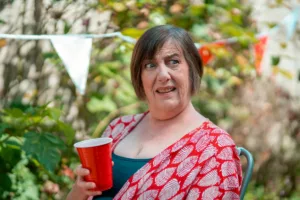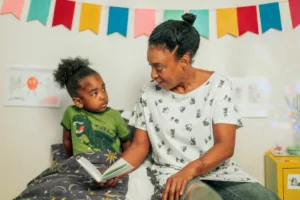
21 Aug 2023 Awareness raising
Jelly bellies, yellow teeth and hairy ears – parents reveal the most EMBARRASSING questions their children have asked
A new survey has revealed the most embarrassing, awkward and often hilarious questions that parents or grandparents surveyed have been asked by children. The survey was undertaken by charities Leukaemia Care and Leukaemia UK, whose #SpotLeukaemia campaign encourages the public to “channel their inner 5-year-old” and ask themselves the embarrassing or difficult questions that could help spot the signs of leukaemia.
“Why do you have a jelly belly?”, “Why are your teeth yellow?” and “Why do you have hairy ears?” are just some of the responses given by UK parents and grandparents surveyed, when asked to provide examples of embarrassing questions they have been asked. A few example questions were provided in the survey, and tummy-related questions led the responses – with around 13% of parents and grandparents surveyed reporting that their child or grandchild had asked, “Why is your belly squishy?”.1
Other hilarious questions reported by parents or grandparents surveyed include:
- Why do you make strange noises when you sleep?
- Why do you have a crinkly face?
- Why do you have a beard up your nose?
- Why is your nose so long?
- Why do you dress like a little elephant?
- Why did you fart?
- Why do you wash my face with your old knickers?
- Why has that man got boobies?
- Why were you and Daddy making weird noises in the room?
- Why were you doing a poo at Granny’s house?
- Why are you buying more wine?
 Across the UK over one in five people (22%) reported their child or grandchild had asked them an embarrassing question in public. Scotland was found to have the ‘cheekiest children’, where this figure rose to one in four (25%).2
Across the UK over one in five people (22%) reported their child or grandchild had asked them an embarrassing question in public. Scotland was found to have the ‘cheekiest children’, where this figure rose to one in four (25%).2
The survey was conducted ahead of Blood Cancer Awareness Month, as Leukaemia Care and Leukaemia UK join forces to launch #SpotLeukaemia. The campaign, which aims to raise awareness of the signs and symptoms of the disease, is encouraging people to “channel their inner 5-year-old” by asking themselves the difficult questions that could help spot leukaemia.
In a new film released today, young children are shown asking their grandparents awkward and embarrassing questions – such as, “Why is your belly squishy?” or, “Why do you have hair up your nose?”. Shortly after, the same children are shown asking, “Why do you have bruises on your arm?” or, “Why are you always too tired to play?”.
The film then urges anyone experiencing unusual symptoms to “channel your inner 5-year-old and ask why”. If the viewer is experiencing fatigue, bruising, unusual bleeding or repeated infections, they are urged to contact their GP and request a blood test. Although the film focuses on the top four symptoms, other symptoms of leukaemia can include fever or night sweats, bone or joint pain and swollen lymph nodes.
Zack Pemberton-Whiteley, Chief Executive of Leukaemia Care, said: “Children ask a lot of questions – sometimes too many – but channelling your inner 5-year-old and asking ‘why’ more often as adults could make all the difference to you or someone you know. Would you stop and think ‘why am I feeling more tired than normal?’, ‘why am I getting unusual or unexplained bruises?’, or ‘why am I getting more infections lately?’. If you didn’t know the answers to these questions, would you see your GP and ask for a blood test? A test could make all the difference. Early diagnosis of leukaemia can improve survival.
The awareness of the public towards the symptoms of leukaemia is still extremely low. We’re aware that there remains a lot of work still to be done to increase people’s knowledge around the symptoms of leukaemia – including extreme tiredness, unusual and unexplained bruising or bleeding, and repeated infections. This year’s Spot Leukaemia campaign video may bring a smile, maybe a laugh, to your face but the message is incredibly serious. 27 people a day are diagnosed with leukaemia. If you have any doubts and these symptoms feel familiar to you or a loved one, please request a blood test from your GP without delay.”
 In the UK, 27 people every day are diagnosed with leukaemia, mainly among the over 65s.3 A lack of awareness of signs and symptoms means people are often diagnosed late, impacting their chances of survival. Only half of leukaemia patients live longer than five years after their diagnosis. The most common symptoms experienced by leukaemia patients are fatigue, repeat infections and bruising or bleeding. Anyone experiencing these symptoms should visit their GP and ask for an urgent blood test.
In the UK, 27 people every day are diagnosed with leukaemia, mainly among the over 65s.3 A lack of awareness of signs and symptoms means people are often diagnosed late, impacting their chances of survival. Only half of leukaemia patients live longer than five years after their diagnosis. The most common symptoms experienced by leukaemia patients are fatigue, repeat infections and bruising or bleeding. Anyone experiencing these symptoms should visit their GP and ask for an urgent blood test.
Fiona Hazell, Chief Executive of Leukaemia UK, said: “Children have a fantastic knack of getting straight to the point with their questions – their no-filter curiosity is something we should all embrace a bit more when it comes to our health. This September, we’re urging everyone to channel their inner 5-year-old and get inquisitive. It’s important to pay attention to our bodies, and by asking ourselves questions like ‘Why am I so tired?’ or ‘Why am I ill again?’ when experiencing unusual symptoms, we could end up spotting the signs of leukaemia in life-saving time.
“Despite decades of progress, only half of leukaemia patients will live longer than five years after diagnosis. Spotting the signs of leukaemia and asking for that all-important blood test can make a meaningful difference in treating this disease.”
1 13.12% of UK parents and grandparents surveyed have been asked why their “belly is squishy” in public by their child or grandchild, according to a new survey. When asked to select any questions that they’d ever been asked, from a list of 9 examples, “why is your belly squishy?” was selected by 13.12% participants. The research was conducted by Censuswide with 2,002 UK nationally representative respondents between 12.07.2023 – 14.07.2023. Censuswide abide by and employ members of the Market Research Society which is based on the ESOMAR principles and are members of The British Polling Council.
2 When asked if they had been asked an embarrassing question in public, 24.9% of respondents in Scotland said yes. This is in contract to: 23.8% in North East; 23.6% in Northern Ireland; 23.5% in South East; 23.5% in Greater London; 22.7% in Wales; 22.5% in North West; 22.0% in East of England; 21.4% in South West; 20.4% in East Midlands; 19.2% in West Midlands.
3 Leukaemia (all subtypes combined) statistics | Cancer Research UK
Related posts
14 March 2023
Percy & Nell says Pants to Leukaemia with bespoke charity collaboration
Independent clothing brand Percy & Nell has produced a unique range of sweatshirts, t-shirts, beanies and tote bags, with all profits going to Leukaemia UK. The collaboration comes off the…
4 June 2022
Leukaemia UK is looking for volunteers for their Patient Experience Advisory Panel
Leukaemia UK is committed to championing advancements in better treatments and care for all. We want to ensure the needs of patients are at the heart of everything we do, and that the voices of people affected by leukaemia and related conditions are being heard. That is why we are setting up a Patient Experience Advisory Panel.
9 May 2018
Sharing this exciting news: a treatment advance for childhood leukaemia
A deal has been struck to let the NHS offer children an expensive new cancer therapy that has been called the most exciting treatment advance for decades
4 August 2020
Our life-saving work must continue
Leukaemia and other blood cancers don’t stop for coronavirus (COVID-19) and our vital research and care must continue